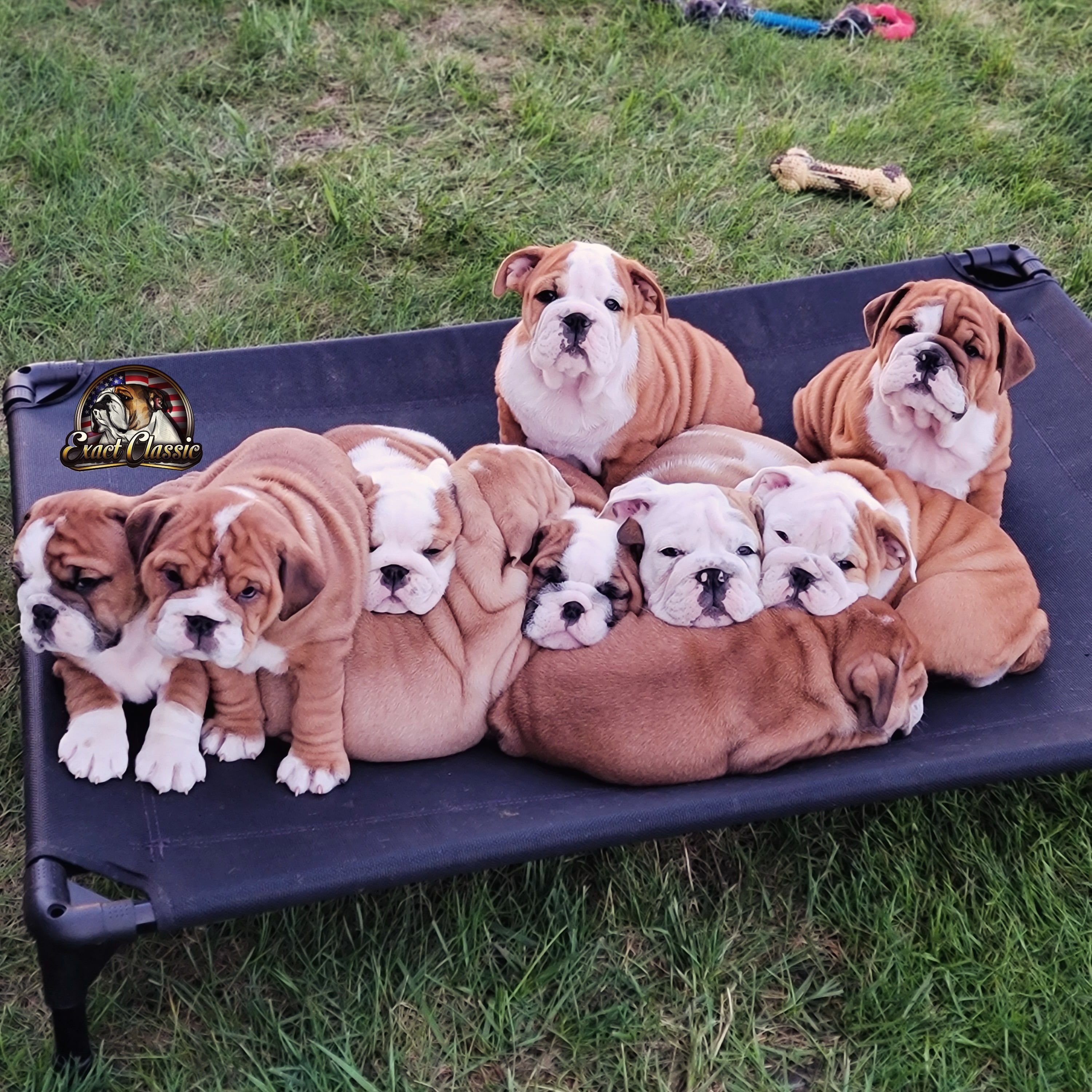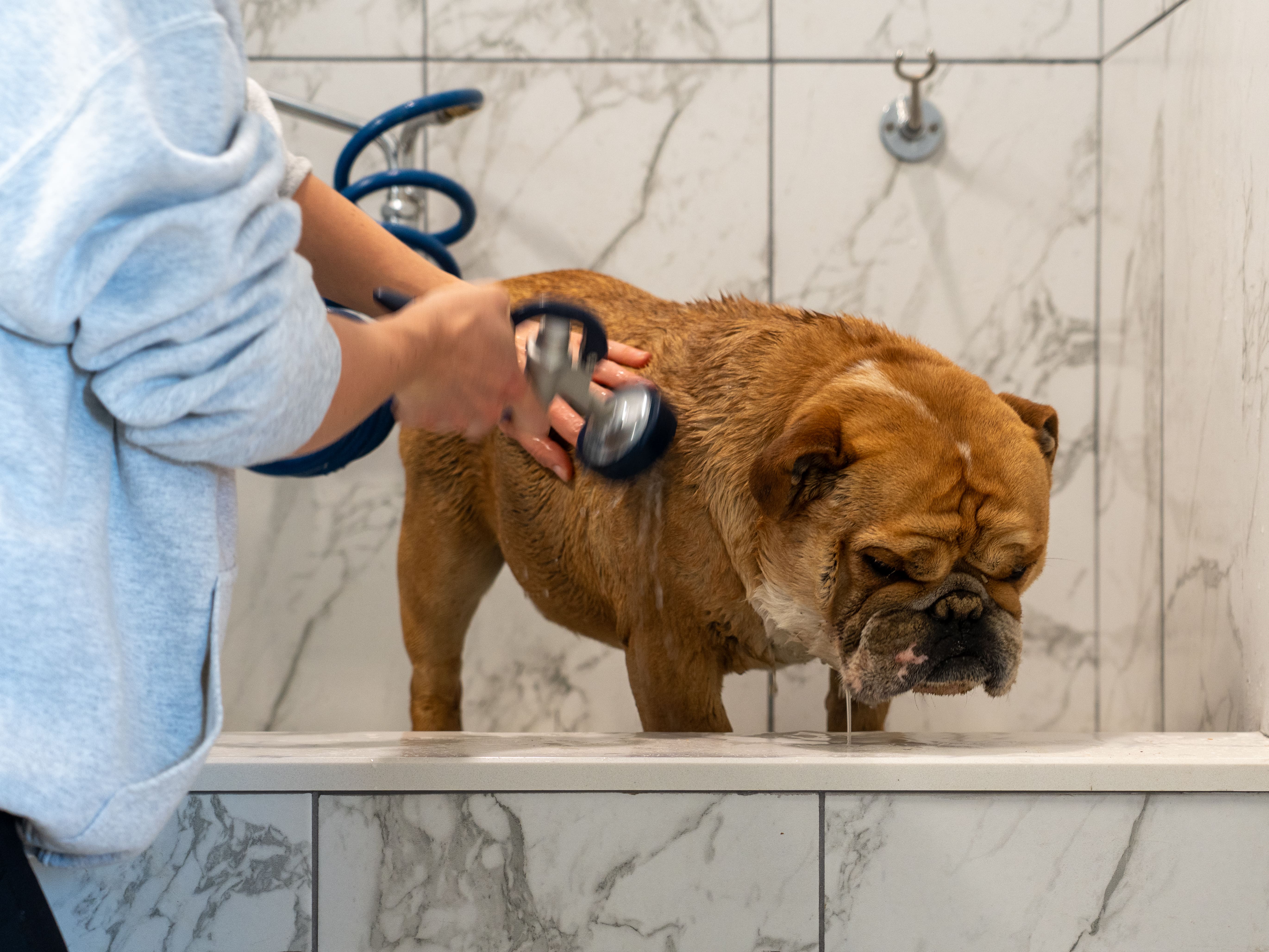Bulldog Care
Caring for the Bulldog
Bulldogs are special. Bulldogs are different. Those of us who have had Bulldogs for several years still remember our first Bulldog and how much we didn't know about them.
Bulldogs are wonderful companions - you'll have a great time with your very own, very special Bulldog.
A bulldog may not be for everyone. All bulldogs are not created equal. What might work for one dog, may not work for another. Please take a moment to read through our page to educate yourself on some bulldog basics.
Bringing Baby Home

Apart from your new buddle of joy, you will also receive records of any immunizations and deworming your puppy was given while in our care, a health certificate from a veterinarian at Auburn Hills Animal Hospital, a signed sales contract, food supply for the next couple of days, recommendations on food, supplements, toys, etc., and your AKC registration packet.
When you arrive home with your puppy, remember - your puppy is a baby Bulldog. Like all babies, he needs lots of love and cuddling, lots of rest and sleep, lots of love and cuddling, lots of good, nourishing food and more love and cuddling.
We strongly recommend that your new puppy continues the supplement regimen and diet we have in place at Exact Classic. We carefully choose the best ingredients and supplements that support our Bulldogs, and we proudly support brands that have the health of our dogs in mind, like NuVet Labs, Albright's Raw Food, Gussy's Gut, and more.
We encourage questions to be asked! knowledge is power, and we believe in equipping our new puppy parents with all the knowledge needed to have the confidence of continuing a natural rearing way approach to raising their pup. We are also here for the lifetime of your new puppy! Please reach out anytime if new questions or concerns arise.
Your puppy should be able to sleep in a crate for a solid 6-8 hours at night without needing to be let out to go potty. We recommend that dinner be fed around 5-6 PM. Removing water around 8 PM. Allow for a final potty break around 10-11 PM, then first morning wakeup and potty around 5-6am. Start your puppy out with crate training at night. DO NOT allow for them to sleep in the bed with you at nights, at least not at first as this can create spoiled tendencies and will increase the chances of having an (even more) stubborn Bulldog.
Sometime during the first couple of weeks, you should take your puppy to your veterinarian for a checkup.
Once the puppy is settled securely into his new home, you can begin to introduce him to your way of doing things.
Vaccinations
We believe in a holistic approach in how we care, treat, and tend to our dogs and puppies. This includes how and when we administer vaccines. There's a lot of controversial information circulating vaccines. We have done our research and have become well educated on this specific topic for our dog's and puppies' sake. We do not recommend ANY vaccines be given at any stage of life. Adopting an Exact Classic puppy is understanding that your puppy will have had zero vaccines at time of pickup. We highly encourage you to keep your puppy vaccine-free once it goes home.
Around 20 weeks your puppy can be taken to the vet and have done what's called a Titer's Test. We HIGHLY RECOMMMEND having a Titers Test done BEFORE having vaccines administered if you're choosing to do that. A Titers Test will check your puppy's antibody levels showing if vaccination would be needed or not. We DO NOT recommend blindly allowing vaccines to be administered, for vaccine overdose can cause long term health problems that can later affect the quality of life, and longevity of your puppy. If you are worried about your puppy not having protective antibodies, schedule to have a Titers Test done around 16 - 20 weeks. This age would allow ample time for maternal antibodies to decline significantly and for your puppy to start producing their own antibodies. If the initial test shows low/no antibodies, retest in a few months to a year of age. Once antibodies are confirmed, you can rest assured that your puppy does not need any vaccines or even an annual Titers test either. These antibodies produced by their own bodies are lifelong! They will have lifelong immunity.
IF you do decide to vaccinate your puppy once you bring it home, we recommend ONLY giving the CORE vaccines which include ONLY Parvo and Distemper. If you make the decision to give your puppy the Rabies vaccine, which we don't recommend doing until your puppy is at least a year old, make sure to ask for the "T free Rabies Vaccine". This is a Thimerosal free option which excludes the mercury component that's used in many vaccines as a preservative. Mercury should never be injected into our animals. Ask for single dose vaccines to be administered to your puppy, as these shouldn't need to contain Thimerosal. We do not vaccinate before 16 weeks due to the maternal antibodies that our puppies have been receiving from mom can interfere with their ability to build their own immunity.
Other vaccines that you may be asked if you would like to have administered may include the Adenovirus, Parainfluenza, Bordetella and Leptospirosis. These are NOT CORE vaccines. These are vaccines that even if your puppy is given, they can still get sick from the virus or bacteria if they come in contact with them. That is why we believe in not over vaccinating and instead starting with a rock-solid foundation of a strong immune system so that way if your puppy does come in contact with one of these strains, it would only build their immune system more rather than debilitating it. This is your way of ensuring your puppy is going to be resilient and not immune compromised.
Equipment
- Food and water dish with straight sides and flat bottoms. The best material is stainless steel - avoid plastic.
- A medium crate with divider - you can adjust the size of space available as the puppy grows without needing to buy bigger crate. A wire crate with a removable bottom is best.
- Heart Beat Puppy - You can find these stuffed animals that have a heartbeat on Amazon. Your puppy will be used to sleeping with its mates that having one of these will help with the transitional phase.
- A harness and lead or a simple 'slip' lead.
- A dog bed - Organic cotton is always a great choice as synthetic fibers can cause skin irritations, allergies, or contain PFAs that you want to steer clear of.
- Nail clippers or grinder.
- Natural dog shampoo bar - You don't want to use anything that will strip them of their natural oils.

- A puppy pen - even if you have a fenced yard, you may want to confine the puppy to or out of a particular area. Puppy pens are easily portable and very handy for keeping a puppy confined to a small area. They are especially useful for a winter puppy. You can put his bed in his crate, put the crate in a puppy pen, and put puppy pads in a corner of the pen.
Toys
ABSOLUTLEY NO RAWHIDE CHEWS! These are bleached with harmful chemicals and have a high risk of causing your dog to choke. Try to stick with "real", "natural", "safe if ingested" toys such as bone and wood. Stay away from plastic, dyed, or fabric unless they are playing with these toys while supervised. This will help prevent foreign bodies from getting stuck in your puppy if swallowed and saving you the extra expense from a preventable surgery
Puppies like knotted socks to shake and play tug of war with. They also like Nylabone toys. Many like to play with balls but be sure the ball is too big to be lodged in the mouth. They also like cotton tug toys like Booda Bones.


